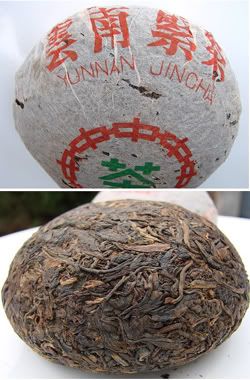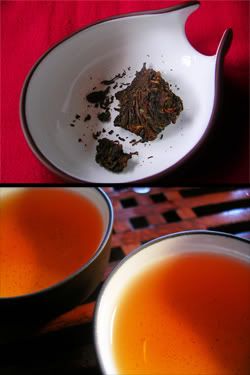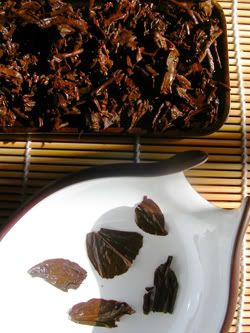 It's the Mayday holiday: traditional English folk dancers (Morris dancers) are combing their beards and polishing their batons, young girls are getting ready to dance around the maypoles. Best of all, it's raining, and we're going to try this tuocha from Houde.
It's the Mayday holiday: traditional English folk dancers (Morris dancers) are combing their beards and polishing their batons, young girls are getting ready to dance around the maypoles. Best of all, it's raining, and we're going to try this tuocha from Houde.In the product description, Guang notes "fruity acidity", and then goes on to talk about the "minty" aroma. I've not found any other notes on this tea - as always, do please point me in the right direction if you have.
The "zhubao" [bamboo wrapped] refers to the enclosure of the tong. The "jincha" [tight tea], visible on the wrapper to the left, is no understatement.
The first point to note is that it has that familiar Xiaguan uber-compression. This is one tough little tea. In fact, it rather reminds of me of some of the specimens in my collection of cropolites [fossilised dinosaur droppings] that I so proudly maintained as a boy. The pieces dropped into the pot with an ungainly "thunk". Not a tea for polite company.
~15cl Caledonian Springs @ 100C in 35cl aged shengpu pot; ~5g of leaf; 1 rinse.
 Dry leaves:
Dry leaves:Excepting the previous comparison with thunder-lizard excreta, this is dark tea, with a few lighter-brown leaves that look as if they could have once been tips, from the fur. A good, shiny appearance all over. A wry smile crosses my lips as I detect no mint whatsoever in the aroma.
15s, 15s, 20s, 25s, 30s, 35s, 40s, 45s, 50s, 55s, 60s, 120s:
Fusty lid-scent with an alkaline finish. The wet leaves are, as Fate would have it, a bit on the minty side. The soup is a good orange, but nothing that would indicate the supposed 20 years of aging; this looks more like 10 years, from the colour. Clearly, the tight-as-tight-can-be compression has hindered its aging.
Already, in the first infusions, the potent chaqi is evident. This reminds me of a recent article penned by MarshalN regarding the potency of some Gedengshan maocha. This is a deeply powerful tea, seemingly loaded with caffeine - it sits right in the forebrain, like a strong coffee.
The character of the tea is very sweet, with a broad base of honeyed woodbine (particularly in the aroma), but covered and interpenetrated by a constant tone of bitter-sweet gan. This tea still has much of youth about it.
The finish in the back of the throat is particularly green, leaving a certain rawness that was quite surprising for a tea that one would have hoped was leaving middle-age.
The greenness in finish and power continue throughout the infusions, during which a 2-hour intermission took place as we went out for our daily walk. This tea is long, and strong.
 Used leaves:
Used leaves:Diced, thoroughly. A decent grade, in that the leaves were once small (when whole), but they have been rather brutalised.
Overall:
The immensely high compression is this tea's undoing. It reminds me of a pupil who spends a lot of time in class, doing all the homework, putting in the hours, but not getting anywhere. This tea has been aging for two decades, but has the accomplishments of one but half its age, which is a shame indeed. It's a good tea, with good aging "potential", given its lovely woodbine flavour and continuing potency, but... do you want to wait 40 years to get a 20-year-old aging? It's almost too harsh to enjoy at the moment, but is drinkable enough.

11 comments:
I try to avoid tuos.... they are usually way too compressed for their own good. I also noticed that even if the leaves of the tuo itself were nice and good.... oftentimes the act of trying to pry them apart will inevitably make them more battered than they need to be, simply because of the way it is compressed. Bings, on the other hand, can easily be taken apart without resorting to a hammer.
I certainly agree with you as far as Xiaguan tuocha goes - the compression makes it difficult to drink and slow to age.
When removing tea from tuocha to use for brewing, I try to follow the same principles as one might with bingcha - gentle insertion and leverage applied at multiple points, in an attempt to get the leaves to relinquish their hold on one another, rather than breaking the elaf structure. As you say, it's difficult not to damage the leaves. Certainly, though, there are strata in the compressed tuocha which can be separated without damage - I believe that I managed to get enough tea in this particular tasting, for example, with a minimum of breakage.
I can't remember the chungyu for this, but it's something to do with the butcher from the story in Zhuangzi using no force in cutting meat, but merely inserting his never-blunting knife into the gaps between the muscles...
After going purple-faced in concentration trying to get tea out of a tuocha, one truly appreciates a bit of Daoism. ;)
Toodlepip,
Hobbes
especially if you make your hand bleed on one of these -cos you misplaced your oyster knife!!
Proceed with caution!
I do have 2 melon-shaped Border tea that are quite petrified. One has to be a stone carver to get the tea out of them. It is a dangerous job especially with the sharp letter opener I own.
That aside, this 80's XG sounds like a wonderful tea. How about breaking them apart and placing the broken pieces in a jar to let it age faster and evenly?
I'm using a letter-opener, too - deadly stuff!
hi hobbes.
i'm working my way through a sample of this tea as i write. must say i agree with you--i do trust guang's veracity re: the date of this tea (or any of his other wares), but although it has some excellent qualities, the feeling of true age is not among them.
as you've said, must be the compression.
mike
methinks i spoke too soon.
while this tea doesn't seem quite as aged as a bing of the same era would, i'm not on the 10th infusion or so, and it keeps getting better--tart cherry, eucalyptus, leather...
mike
Mike,
It sounds like you're struck a previously-undiscovered vein of ore - I'll revisit this one with interest.
Thanks, and toodlepip,
Hobbes
if it helps at all: i used about 4 grams of leaf, very carefully separated, in a 4 ounce gaiwan. full boil water, very short infusions for the first 4-5, then gradually longer. pretty typical parameters. something very good happened around the 7th or 8th infusion...
mike
It certainly does help - thanks, Mike. I think pre-separation is the major difference between our techniques, and something I shall attempt for the next sitting. Lord knows it needs it... :)
Toodlepip,
Hobbes
Post a Comment